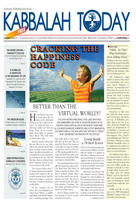* Cracking the Happiness Code – To crack the happiness code, we must start by realizing who we really are, what our nature is. more…
* Better than the Virtual World!? – Our attraction to the virtual world indicates great progress in human evolution. It plays an important role in humanity’s preparation for spirituality. more…
* The Freedom Blues – When you realize that there is no freedom in this world, you’ll begin asking about the meaning of it all, and then you’re on your way to real freedom. more…
* The Desire Grows – Humanity Evolves – Whether it is the tiniest movement of our body, or humanity’s entire evolution, all we do is motivated by one thing only – the desire for pleasure. more…
View/Download Kabbalah Today Issue 11:
* E-version
* PDF version
* Word version
Click Here to Sign Up for a Free Kabbalah Introductory Course – Starts Soon!





